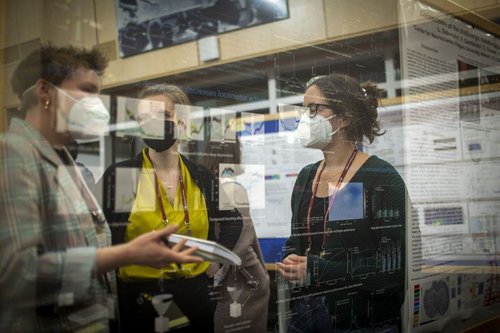Research Group Behavioral Neuroscience
Sleep deprivation is a common and underestimated problem in modern society. A permanently disrupted sleep-wake cycle can lead to serious health consequences. After just one night of sleep deprivation, people show a deficit in memory, attention and decision-making as well as an increased reaction time. The consequences of sleep deprivation manifest themselves in almost all areas of our daily lives, from cognitive impairment to effects on the cardiovascular system. But what specific processes lead to these drastic consequences of sleep deprivation? Which specific brain networks are particularly susceptible to the effects of sleep deprivation? Despite years of research, the mechanisms that control the dramatic effects of sleep deprivation are not well understood.
We are focused on decoding the exact mechanisms behind the negative consequences of sleep deprivation. We strive to understand how the lack of adequate sleep affects specific neuronal circuits and what role these changes play in memory, attention and cognitive function.
Our research is essential not only to understand the fundamental processes associated with sleep deprivation, but also to subsequently identify potential interventions that could mitigate the negative effects. With our research, we are helping to significantly advance the understanding of changes in the brain after a night without sleep, helping to clarify a long-standing question in science.
- Head
Head

Dr. Hanna Zwaka studied biology at the Freie Universität Berlin, where she completed her doctorate with Prof. Randolf Menzel. Her dissertation was entitled "Behavioral and neural analysis of learning and memory in the honeybee Apis mellifera", for which she graduated with great success in 2015.
After completing her dissertation, she continued her research, first as a Research Assistant for Bertram Gerber at the Leibniz Institute of Neurobiology and then as a Postdoctoral Fellow at Harvard University from 2016 to 2023. From learning research in bees to decision-making in larval zebrafish, she has conducted research in a wide range of areas. Her current research focuses on the effects of sleep deprivation on brain and behavior.
Outside of her research, Hanna Zwaka is heavily involved in teaching, mentoring and science communication. As a member of the Harvard Task Force on Diversity, Inclusion, and Belonging, she is particularly active in promoting inclusion in science and living a diverse lab. - Team

Hanna Zwaka 
Paula Pflitsch 
Marion Möckel Team
Head Dr. Hanna Zwaka
+49-391-6263-94441
hanna.zwaka@lin-magdeburg.de
PhD student Paula Pflitsch +49 391 6263 93431 paula.pflitsch@lin-magdeburg.de I am investigating the impact of sleep deprivation in larval zebrafish on the olfactory system through behavioral studies, molecular assays, and imaging. I hope this research can lead to a better understanding of the molecular and neural pathways impacted by sleep and sleep deprivation across species.
Lab Assistant Marion Möckel +49 391 6263 93431 I support our team with extensive experience in both fundamental and clinical research as well as in teaching in the administrative, technical and scientific areas. Master's students Chiara Maria Brizioli Xenia-Leandra Ringwald Team Assistant Emilya Schubert +49-391-6263-93432 emilya.schubert@lin-magdeburg.de Former Team members Kayra Yildirim - Communication and outreach
Communication and outreach
"For me personally, science communication is about awakening a sense of wonder in children and adults and arousing interest in our research." Hanna Zwaka
Outreach
Being a scientist, the topic of outreach is particularly close to my heart. The connection between science and society is crucial for understanding complex topics and fostering curiosity and engagement in research. Through workshops, talks and interactive events, I want to inspire enthusiasm for science and convey an understanding of its importance. It is important to me that everyone has the opportunity to get interested and involved in science, regardless of their background or gender. It is a central concern in my lab to break down barriers in the STEM field and to live diversity, equality and inclusion.
Breaking down barriers of all kinds is also the goal of The Social Scientist mentoring program. Contact with role models and the opportunity to ask any question gives many people more access to the natural sciences. Mentoring and exchange, especially for women in this field, is offered by the Harvard Graduate Women in Science and Engineering Program. I am active in both networks. - Projects
Projects
Sleep deprivation affects movement stabilization in zebrafish larvae
We are all familiar with the effects of sleep deprivation. After a sleepless night, we feel tired, sluggish and mentally foggy. Almost every aspect of our daily lives is affected by a lack of sleep. But what processes lead to these drastic effects of sleep deprivation? Which brain networks are susceptible to sleep deprivation? To address these questions, I developed an experimental paradigm for sleep deprivation in zebrafish larvae in collaboration with the labs of Alexander Schier at the University of Basel and Jason Rihel at UCL.
Zebrafish larvae have proven to be a powerful model to study sleep in vertebrates, as they possess an anatomically and molecularly conserved vertebrate brain. This allows us to record the activity of individual cells in living and behaving animals.
Our research shows that the behavior of zebrafish changes when they are prevented from sleeping by light. After just one sleepless night, zebrafish larvae showed slower movements and increased reaction time in a simple decision task. Surprisingly, the performance of the sleep-deprived larvae improved compared to a rested control group. We hypothesize that the animals benefit from waiting longer in a decision moment. Their longer reaction time gives them more time to integrate information from their environment before making their decision. This phenomenon is commonly known as the speed accuracy trade-off.Physical understanding in zebrafish larvae
To explore the evolutionary origins of object perception, I have been working with my colleague Andrew Bolton to investigate whether a rather primitive vertebrate, the larval zebrafish, responds to the presence of obstacles in its environment. The zebrafish, which has become a useful model for studying neuronal circuits in the brain, performs rapid escape swimming movements when threatened by predators. We hypothesized that collisions with solid objects during escape would be life-threatening for the zebrafish, and therefore the direction of escape movements would be influenced by the position of obstacles. Our results show that zebrafish pay attention to nearby obstacles to avoid collisions during escape. By selectively sclerosing individual neurons, I was able to show that visual information ultimately results in an excitatory projection to a unique neuron, the so-called Mauthner neuron, which is responsible for directing the zebrafish's escape movements away from obstacles. These results show that zebrafish have a naive understanding of physics.
Memory consolidation during sleep in honeybees
Sleep plays a crucial role in the consolidation of newly acquired memory content after learning. During my PhD, I investigated whether the role of sleep in memory processing is similar in evolutionarily distant species.
To answer this question, I developed a honeybee sleep system in which individual bees were tracked in real time using image processing systems to present them with learned odors during the night. Together with a group of students, I was able to show that in honeybees, presenting an odor during deep sleep that had already been presented during learning improved memory performance the next day. In contrast, the presentation of this contextual odor during the waking phase or the presentation of new odors during sleep did not lead to an improvement in memory performance.
Similarly, in humans, memory consolidation can be triggered by the presentation of a context odor during slow-wave sleep. My results suggest that deep sleep periods in honeybees have the potential to improve memory consolidation in a similar way to humans. This study provides compelling evidence for a conserved role of sleep - and how it affects memory processes - from insects to mammals.Memory amplifier in an old medicinal plant
Cognitive impairment can have a significant impact on our quality of life, and preventing or combating it is of great value. In collaboration with a team of researchers at the Leibniz Institute of Neurobiology working with flies, bees and rats, I have been investigating the potential of the plant Rhodiola Rosea (rose root) to counteract cognitive impairment in these model organisms.
As part of our research, we have identified the ingredient ferulic acid eicosyl ester as a memory enhancer. These findings could open up the potential for clinical applications and thus make a significant contribution to the prevention or treatment of cognitive impairment.Learning and memory of the honeybee
Insects are ideal models for the study of neural networks underlying different behaviors. Despite their comparatively small brains, they manage complex tasks in their environments, including various forms of learning such as classical and operant learning. One crucial brain area is the so-called mushroom body, which is important for memory formation and sensory processing in insects.
In my research, I intracellularly stained and reconstructed certain classes of neurons in the mushroom body and entered them into a 3D brain atlas of the honeybee. I used this information to derive the morphology of the neurons.
A detailed understanding of the neuronal anatomy in the insect brain makes it possible to derive circuit models for learning and memory and to test these models with physiological data. In my work, I have been particularly interested in the question of whether neurons in the mushroom body undergo plasticity changes during classical conditioning. By simultaneously measuring Ca2+ responses in the synapses and conditioned behavioral responses to learned odors in honeybees, we were able to detect reward-specific plasticity during conditioning. It was hypothesized that this circuit-specific neuronal plasticity correlates with the learned value of the stimulus.
In further studies, I pioneered the first neural recordings in stationary honeybees to investigate the neural correlates of operant learning. By developing a virtual environment that simulates a simplified 3D world for honeybees, I was able to show that these animals transfer learned information from free flight to the virtual world. Searching for neuronal connections of operant learning, I recorded the neurons of the mushroom body over several days during learning and discovered specific changes in neuronal activity that were tuned to the rewarded and unrewarded visual stimuli. These results suggest that the mushroom body is involved in the process of operant learning in the honeybee. - Partner lab
Partner lab
Our laboratory is an official partner of Harvard University and works closely together on research into sleep in zebrafish. This involves a lively exchange of information and manpower. Students have the opportunity to conduct part of their research directly at Harvard University.
- Publications
Publications
Krishnan, K., Muthukumar, A., Sterrett, S., Pflitsch, P., Fairhall, A., Fishman, M., Bahl, A., Zwaka, H.* and Engert, F.* Attentional Switching in Larval Zebrafish: The Attentive Leaky Integrator. Researchsquare. Under review in Nature. *Contributed equally
2023
Kraus, A., Garcia, B., Ma, J., Herrera, K., Zwaka, H., Harpaz, R., Wong, R., Engert, F., Salinas, I.. Peripheral detection of viruses shapes brain immunity and behavior in zebrafish. Elife 2023
2022
Zwaka, H., McGinnis, O.J., Pflitsch, P., Prabha, S., Mansinghka, V., Engert, F., Bolton, A. Visual object detection biases escape trajectories following acoustic startle in larval zebrafish, Current Biology 2022
2019
Zwaka, H., Bartels, R., Lehfeldt, S., Jusyte, M., Hantke, S., Menzel, S., Gora, J., Alberdi, R., Menzel, R., 2019. Learning and its neural correlates in a virtual environment for honeybees. Front. Behav. Neurosci. 279.
2018
Haenicke, J., Yamagata, N., Zwaka, H., Nawrot, M., Menzel, R., 2018. Neural correlates of odor learning in the presynaptic microglomerular circuitry in the honeybee mushroom body calyx. eNeuro 5.
Michels, B.*, Zwaka, H.*, Bartels, R., Lushchak, O., Franke, K., Endres, T., Fendt, M., Song, I., Bakr, M., Budragchaa, T., 2018. Memory enhancement by ferulic acid ester across species. Science Advances. 4, eaat6994. *Contributed equally
Zwaka, H., Bartels, R.*, Grünewald, B., Menzel, R., 2018. Neural organization of A3 mushroom body extrinsic neurons in the honeybee brain. Front. Neuroanat. 12, 57.
2016
Zwaka, H., Münch, D., Manz, G., Menzel, R., Rybak, J., 2016. The circuitry of olfactory projection neurons in the brain of the honeybee, Apis mellifera. Front. Neuroanat. 10, 90.
2015
Zwaka, H., Bartels, R., Gora, J., Franck, V., Culo, A., Götsch, M., Menzel, R., 2015. Context odor presentation during sleep enhances memory in honeybees. Current Biology. 25, 2869–2874.
Schallschmidt, K., Becker, R., Zwaka, H., Menzel, R., Johnen, D., Fischer-Tenhagen, C., Rolff, J., Nehls, I., 2015. In vitro cultured lung cancer cells are not suitable for animal-based breath biomarker detection. J. Breath Res. 9, 027103.
- Open positions
Open positions
I welcome applications from candidates with a strong interest in research who would like to join our team. In my lab, we place great value on diversity and inclusion, valuing different perspectives and backgrounds. My goal is to create a diverse lab where all people are welcome and can develop freely. If you are passionate about research, I look forward to welcoming you to our team.
We always have room for motivated Bachelor and Master students who plan to spend at least 6 months in the lab.
Currently, we do not have funding for PhD students and postdocs. If you are interested, you can apply and we will apply for funding together.

![[Translate to English:] [Translate to English:]](/fileadmin/_processed_/9/2/csm_photo_2022-05-01_20-33-58_b56217777b.jpg)
